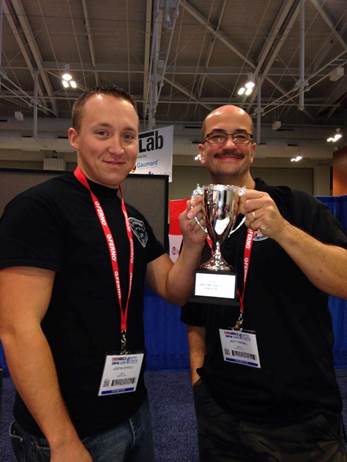A Pittsburgh Emergency Medical Services (EMS) crew won first place in the cardiopulmonary resuscitation (CPR) competition at the EMS World Expo in Nashville on Wednesday.
Pittsburgh paramedics Jeffrey Tremel, from Medic 2 in Knoxville , and Justin Sypolt, from Medic 11 in Homewood, were last-minute entries to the American Heart Association (AHA) CPR Throw Down event that included 30 teams from around the world.
 “Justin had been watching the early teams and came back to me and basically said, ‘Hey, we can win this,’” said Tremel. “We signed up right at the deadline and were one of the only two-person teams in the competition. Most of the teams had at least a three-man crew.”
“Justin had been watching the early teams and came back to me and basically said, ‘Hey, we can win this,’” said Tremel. “We signed up right at the deadline and were one of the only two-person teams in the competition. Most of the teams had at least a three-man crew.”
The teams were required to perform four minutes of CPR on a mannequin while monitors measured rates, depth and effectiveness. Three judges watched and evaluated the teams on performance.
In recent years, Pittsburgh’s Department of Public Safety has partnered with the Department of Emergency Medicine at UPMC to improve the survival rate of patients suffering cardiac arrest.
“We know CPR quality is directly linked to survival. UPMC has been involved in training the paramedics in the care of victims of cardiac arrest with a focus on CPR quality,” said Ronald Roth, M.D., medical director for the City of Pittsburgh Department of Public Safety and chief of Division of EMS, UPMC. “Our current survival rate is 16 percent for out of hospital cardiac arrest. About 15 to 20 years ago, survival from cardiac arrest was about 3 percent, and that was average for most large cities.”
The Resuscitation Outcomes Consortium (ROC), a clinical trial network led by Clifton Callaway, M.D., vice chair of emergency medicine at UPMC, is focused on researching sudden cardiac arrest and severe traumatic injury and reviews every cardiac arrest resuscitation performed by Pittsburgh EMS. As part of the review, crews get feedback on the quality of CPR provided. The CPR on scene is recorded on EKG monitors obtained as part of the ROC study.








